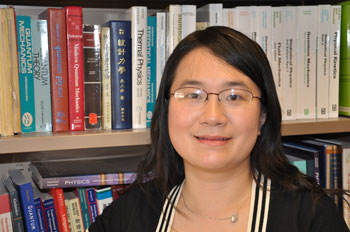| Posted: July 9, 2009 |
Nanoscientist receives highest honor U.S. government bestows on young scientists or engineers |
|
(Nanowerk News) UC Riverside’s Chun Ning (Jeanie) Lau has received a national honor that few outstanding researchers who are beginning their independent research careers are given.
|
|
Lau, an associate professor of physics, is one of the recipients of the Presidential Early Career Awards for Scientists and Engineers (PECASE) for the 2008 competition. PECASE represents the highest honor a beginning scientist or engineer can receive in the United States.
|
 |
| Chun Ning (Jeanie) Lau
|
|
Established in 1996, the PECASE program recognizes outstanding scientists and engineers who, early in their careers, show exceptional potential for leadership at the frontiers of knowledge. A total of 100 PECASE winners were named for 2008.
|
|
Selection for the award is based on nominees’ innovative research at the frontiers of science and technology as well as community service demonstrated through scientific leadership, education or community outreach. The White House Office of Science and Technology Policy selects the awardees.
|
|
Lau and the other PECASE winners will be presented with their awards at a White House ceremony in the fall of 2009.
|
|
Individuals cannot apply for PECASE. A handful of participating funding agencies nominate young scientists and engineers for the awards. Each year the National Science Foundation (NSF) selects up to 20 nominees for PECASE from among those who have received awards under the NSF’s CAREER program and who are most likely to become leaders of academic research and education in the twenty-first century.
|
|
Lau, the first PECASE winner at UCR, received a CAREER award from NSF in 2008, enabling her to experimentally investigate the electrical properties of graphene coupled to normal and superconducting electrodes. Graphene, first experimentally isolated in 2004, consists of carbon atoms only one atomic layer thick, with the unique characteristic that its electrons behave as if they have zero mass. Graphene has attracted tremendous attention from academic and industrial sectors for its potential as the “material of the future” to supplement or replace silicon in electronic circuits.
|
|
Besides graphene, Lau studies nanowires and carbon nanotubes. Her research has helped physicists gain fundamental understanding of how atoms and electrons behave when they are ruled by quantum mechanics. Her lab studies novel electrical properties that arise from the quantum confinement of atoms and charges to nanoscale systems. Her research team has shown that graphene can act as an atomic-scale billiard table, with electric charges acting as billiard balls.
|
|
|
|
Her other research interests include superconductivity, thermal management and electronic transport in nanostructures, and engineering new classes of nanoscale devices.
|
|
An educational component of Lau’s research effort is the active involvement of high school, undergraduate, and graduate students, especially minority and women, in her cutting-edge research, taking advantage of the ethnic diversity of UCR’s student population and local communities. She is a founding faculty member of the UCR Undergraduate Research Journal. She also organized a “Women in Physics” lunch group that provides a friendly platform for female students, postdocs and faculty members to interact.
|
|
After receiving her bachelor’s degree in physics from the University of Chicago in 1994, Lau proceeded to Harvard University from where she received her master’s and doctoral degrees in physics in 1997 and 2001, respectively. She joined UCR in 2004, after an appointment as a research associate in the Hewlett-Packard Laboratory. At UCR she is a member of the Center for Nanoscale Science and Engineering.
|
|
Lau’s awards and honors include the Richter Fellowship for Undergraduate Research, 1992; a David W. Grainger Senior Scholarship, 1993; and a Robert T. Poe Faculty Development Grant from the Chinese-American Faculty Association of Southern California, 2007. She has published more than 30 research articles in peer-reviewed journals.
|

